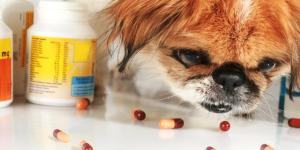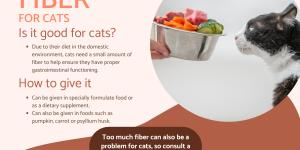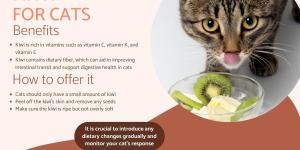Vitamin B for Cats - Importance, Dosage and Side Effects



See files for Cats
B-complex vitamins play an important role in numerous bodily functions and are necessary micronutrients in the cat's diet to maintain its health and normal physiological state. In general, cats fed a complete diet and receiving the recommended amount of food daily should be able to all the vitamins in this complex through food and should not require supplementation. In other cases, it is worthwhile to offer cats a food supplement with B vitamins and to know which foods with B vitamins are suitable for cats.
Continue reading this article on AnimalWised to learn more about the benefits of vitamin B for cats, which are the best supplements, and how to know if your cat has a vitamin B deficiency.
What is vitamin B and what is its function?
The B-complex vitamins belong to the group of water-soluble vitamins, i.e., they dissolve in water and are excreted in the urine, unlike fat-soluble vitamins, which can cause poisoning by accumulating in the body because they cannot dissolve in liquids. In general, the B vitamins are involved in the immune system, brain, fat and protein metabolism, vision, hair appearance, growth and development, pregnancy and lactation, and stress management.
The B vitamin complex contains the following vitamins:
- Vitamin B1 or thiamine: intervenes in the functions of the nervous system and increases appetite.
- Vitamin B2 or riboflavin: it is important for the good functioning of vision and for the healthy appearance of the cat's coat.
- Vitamin B3 or niacin: also improves appetite and facilitates digestion.
- Vitamin B5 or pantothenic acid: helps in fat metabolism.
- Vitamin B6 or pyridoxine: is an indispensable vitamin for protein metabolism.
- Vitamin B8 or biotin: contributes to the appearance of the hair and facilitates the metabolism of fats, carbohydrates, and proteins.
- Vitamin B9 or folic acid: prevents fetal malformations, being essential during pregnancy and in the formation of new cells.
- Vitamin B12 or cobalamin: is involved in the formation of blood cells, such as red blood cells or erythrocytes.
What does vitamin B do in cats?
The vitamins of the B-complex, as we have already mentioned, are involved in numerous vital functions and the maintenance of the body structures of our cats.
In addition, the vitamins thiamine (B1), pyridoxine (B6), folic acid (B9) and cobalamin (B12), in particular, are essential for good cognitive function and neurological development of the cat. Cats rely on these enzymes for the conversion of homocysteine into other substances useful to the body. If the cat happens to be deficient in these vitamins, homocysteine would accumulate in the blood, which could lead to cardiovascular problems or cognitive impairment.
Furthermore, cats need the B vitamins for the following reasons:
- They are involved in cell differentiation.
- They stimulate metabolism.
- They are important for skin and hair.
- They stimulate the immune system.
- They are involved in the biochemistry of the nervous system.
- They help to fight stress.
To ensure your cat receives the best nutrition, read this article on the best diet for cats.
Vitamin B deficiency in cats
While cats fed the correct proportions and daily amounts of cat food are unlikely to experience a deficiency of B-complex vitamins, those with digestive disorders or the elderly may be affected. If a cat has digestive tract malabsorption, it will not absorb essential nutrients such as these vitamins. This is especially true for vitamin B12, whose absorption depends on the good function of the pancreas and the mucosa of the small intestine. A vitamin's half-life is shortened from 13 to 5 days in conditions like pancreatitis, cholangiohepatitis, and intestinal lymphoma (inflammatory bowel disease, pancreatitis, or cholangitis).
Recent studies have shown that older cats (especially females) do not retain as much of this vitamin regardless of their diet. For this reason, vitamin B12 supplementation is recommended for all cats with gastrointestinal disease or when vitamin B12 levels are less than 300 ng/L.
Dosage of vitamin B for cats
In dietary supplements, the dose of these vitamins depends on the manufacturer and the dosage form. They are available as pills or tablets, but also as pastes or injectables. The dosage depends on the individual needs of each cat. All of the B-complex vitamins can be supplemented or just some of them, although supplementation of vitamin B12 or cobalamin alone is especially common in cats with digestive problems or in older cats. Never offer your cat supplements containing these vitamins that are intended for humans, and always seek veterinary advice before giving your cat any type of supplement.
For vitamin B nutrition, it depends on the diet you give your cat, as it is not the same whether you add natural food to a diet based mostly on dry food, wet food or a 100% homemade diet. Any kind of vitamin supplementation should only be added after consulting a veterinarian specializing in nutrition.
How to give vitamin B to a cat?
The dosage of B vitamins you give your cat depends on the product presentation and the cat's needs: one or two tablets, a specified amount of paste, or injections. Vitamin complexes dissolve in water, so they must be administered daily to avoid accumulation in the cat's body.
For cats with cognitive impairment, you can opt for a B vitamin supplement that also contains L-carnitine and L-tryptophan, which support communication and metabolism of brain cells and neurons.
Foods with vitamin B for cats
We can also offer our cats natural foods that contain high levels of vitamin B on certain occasions and always as a supplement to their usual diet. These foods include:
- Animal organ meats such as liver and kidney
- Pork
- Chicken or turkey meat
- Rabbit meat
- Sardines
- Salmon
- Tuna
- Eggs
If our cat follows a homemade diet, it is not a problem to include these foods, since animal protein should make up 80-90% of the daily diet, as the cat is a strict carnivore. Of course, we also recommend consulting a veterinarian specialized in cat nutrition to avoid nutritional deficiencies.
Other foods such as nuts, vegetables, brewer's yeast, cereals, and dairy products are also important sources of these vitamins. Since cats are carnivores, however, these foods should not be offered regularly or in large quantities to small cats to prevent poisoning. Vegetables, for example, should not exceed 5-10% of the total daily diet.
Be sure to read this article before giving your cat any fruits or vegetables to learn which ones may be harmful to your cat: Fruits and vegetables cats should not eat.
Side Effects of Vitamin B for Cats
B vitamins are generally safe because they do not accumulate in the body and therefore have little toxic effect. However, high or prolonged doses of pyridoxine or vitamin B6 may cause muscle weakness and incoordination.
Another situation that can lead to side effects is rapid intravenous administration of these vitamins, which can result in vomiting, malaise, or nausea. Allergic reactions are rare, but they can happen.
If you want to read similar articles to Vitamin B for Cats - Importance, Dosage and Side Effects, we recommend you visit our Healthy diets category.
- LP Case, DP Carey. (2001). Canine and Feline Nutrition . Harcourt Editions, S.A.





